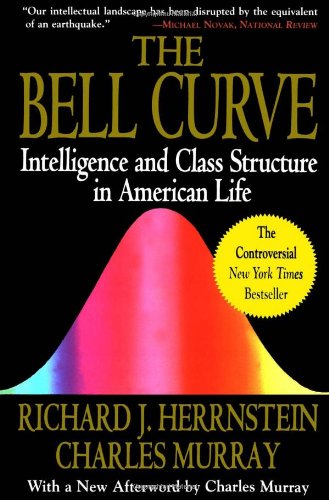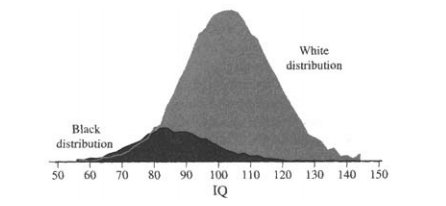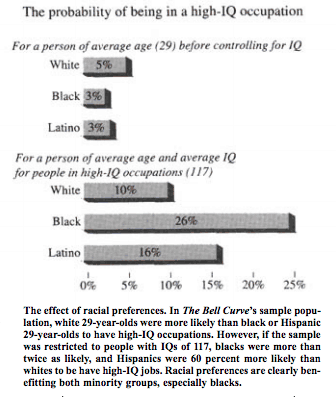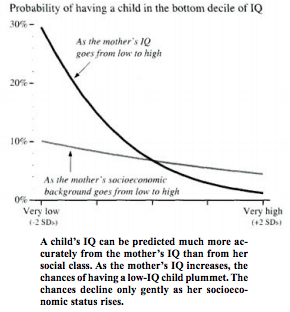Looking Back at the Bell Curve
Christopher Brand, American Renaissance, March 2005
The publication of The Bell Curve (TBC) in 1994 by economist Charles Murray and psychologist Richard Herrnstein was one of the more dramatic events in 20th century differential psychology. Only the physical assaults by leftists on IQ researchers Hans Eysenck and Arthur Jensen around 1980 compare with it — and perhaps the Sunday Times’s 1976 allegations that Sir Cyril Burt cooked his twin data to exaggerate the heritability of IQ.

Still considered “controversial.”
At first, I thought things would go well for TBC. The book demonstrated enormous scholarship, and was written clearly and without racial animosity. I immediately gave a seminar on it in the psychology department of Edinburgh University. Though there were quizzical faces among liberal-leftist staff, I was optimistic that the central findings of the London School — the tradition of exploring measurable human psychological differences in the tradition of the hereditarian Sir Francis Galton — were on their way towards greater acceptance.
I was wrong. Quickly, TBC’s defense of the importance of IQ (and to some extent of genes) ran into what one observer called “a barrage of scathing critiques and ad hominem attacks on the book’s authors,” followed by silence. The only exception was a further dozen books that came late and little remarked, claiming to rebut TBC. Though many ordinary people bought the book, it remained publicly unmentionable in any positive way by any substantial person. Its policy proposals of limiting welfare, controlling immigration, discouraging low-IQ mothering, raising standards, and eliminating “affirmative action” do not even appear to appeal to George W. Bush, allegedly the most “right-wing” US President since the 1920s.
Assessing the Impact
In 2004, ten years after the publication of the book, I used the Internet search engine Google to make a rough estimate of the impact TBC had had on the intellectual climate. Although this is by no means a perfect method, it allows rough comparisons; someone who appears on many Internet pages has had greater intellectual influence than someone who seldom appears. A search for “The Bell Curve,” together with the name “Murray,” turned up 14,700 pages — a respectable number, though far fewer than the 40,000 pages that mentioned the influential anti-IQ book, Multiple Intelligences, together with its author’s name, Howard Gardner, or the 50,000 pages for Emotional Intelligence along with author Daniel Goleman.
I then examined the top 100 Internet pages for TBC, and found that 60 went beyond a brief mention and included serious commentary. Of these 60 pages, however, only eight (13 percent) generally accepted TBC’s thesis, seven (12 percent) were ambivalent, while 45 (75 percent) were plainly hostile. By contrast, the internet pages that referred to Multiple Intelligences (written in 1993) and Emotional Intelligence (written in 1995) were overwhelmingly favorable.
In 2000, journalists Peter Brimelow and Steve Sailer had noted on their VDARE.com web page that discussion of IQ and race had actually become more difficult as the 1990s progressed. Daniel Seligman, who had written a very readable little volume on the IQ debate in 1992 called A Question of Intelligence, also thought the atmosphere for discussing IQ and race had deteriorated. In his view, the liberal-left had shouted down all serious talk of IQ and had thereby “won” the argument. Ron Unz, who has campaigned to eliminate “bilingual education,” thought America’s intellectual elite had become significantly more frightened to talk about IQ since 1994.
Although it forced its way onto academic reference lists, TBC had emphatically not turned the tide. If an educator or politician has ever admitted he was positively influenced by the book, I have yet to hear of it. It may be permissible to joke in letters to the editor about “new excesses of political correctness,” but no one in the political or media mainstream will mention the problem of the black American average IQ of 85, let alone the black IQ in sub-Saharan Africa of about 70.
Occasionally young journalists get carried away with this great story, but efforts to report it, as in the Spectator (May 24, 2003) and the London Times (Nov. 10, 2003), quickly bring down the iron curtain. Despite a half-page article and map of worldwide IQ distribution displayed on page 9 of the Times, Google found no subsequent mention of the article in the British press. Absolute repression works pretty absolutely.
What top psychometrician Raymond Cattell (1905-1998) first called “ignoracism” reigns so supreme today that there is continuous pseudo-hysteria in the Western press over the lack of black police chiefs, army generals, surgeons, lawyers, accountants, professors, etc. Aside from a few brave souls like Linda Gottfredson, no one outside the London School dares offer the correct explanation, and certainly not by referencing Charles Murray and Richard Herrnstein. So slight was TBC’s public impact that the “conservative” president George W. Bush even proposed in 2004 that every American child receive two years of college, and he declined to oppose racial preferences at the University of Michigan. Richard Lynn’s 2002 book, IQ and the Wealth of Nations, which explains the link between a nation’s average IQ and its GNP, remains unreviewed in any important academic journal.

But the real ignoracist comedy has been the 2001 No Child Left Behind Act, which will apply increasingly tough academic standards to all American schools, and officially categorize them as “failing” even if only blacks or Hispanics are not up to snuff. Perhaps when good-quality suburban schools are designated as failures only because blacks cannot pass the tests — and school administrators face the dire sanctions for “failure” — people will begin to say the words “race and intelligence” out loud again. In this climate, the London School has had nothing resembling impact.
Some might argue that TBC did not have great influence because it was flawed in some respect. I myself doubted its thesis that America became substantially more stratified by IQ during the 20th century. (I think Americans, in an attempt to distinguish themselves from “old” Europe, underestimate the degree to which they have always had a full-blown class system, with blacks at the bottom.) Other supporters of the book noted its reluctance to talk about the heritability of racial differences in intelligence.
In fact, TBC has stood up well to criticism. Liberals blamed the authors for relying on race realists like Richard Lynn and Philippe Rushton. Yet, around 2000, both those scholars produced high-quality new evidence for the devastatingly low black IQ, implying that this is what largely explains the enduring poverty of sub-Saharan Africa. When new American data published in a new Festschrift for Arthur Jensen showed the especially strong influence of g (the “general factor,” the purest measure of intelligence) in the lower-ability range, it became clear that TBC had, if anything, underestimated the importance of IQ in accounting for variance in mental ability.
Through the 1990s, the left relied heavily on the so-called Flynn Effect, pointing out that IQ scores rose throughout the 20th century. They eagerly explained that this must be due to environmental influences — the genes haven’t changed rapidly — and argued that the same influences would eventually bring the black IQ up to the same level as that of whites. The Flynn Effect is not yet entirely understood, but Philippe Rushton has shown that the highest gains in scores have been in tests that are in fact not heavily g-loaded — that is to say, in tests that measure things like memory or specific knowledge in addition to intelligence.
At the same time, the much-touted and anticipated narrowing of the black/white gap has simply not occurred. As educators Abigail and Stephan Thernstrom pointed out in their 2003 book, No Excuses, the racial gap in educational achievement in 2000 was actually wider than in the 1980s. If the Flynn Effect is real, and IQs really are rising, the IQs of whites are rising just as rapidly as those of blacks.
The problem TBC ran into was not refutation or bad empirical evidence, but rather the neurotic relativism of “postmodernists” who have taken over large swathes of the universities of the West. One of their favorite doctrines is that nothing can be really measured or known, especially if it is to the disadvantage of non-whites or women. In 1994, I did not appreciate the sheer scale of this problem — the power with which postmodernism enforced its decrees that race and sex not be researched or discussed unless it is to the advantage of precious “victims.” Political correctness had become the new religion of the West.
To evaluate the respective influences of the London School and its opponents, I compared the number of Google pages devoted to each. To identify the leaders on both sides, I first looked for the number of pages that listed more than one of some 25 London School “big names.” I found, for example, that 741 pages referred to both “Arthur Jensen” and “Charles Murray.” In this way, I established that there are eight clear leaders among hereditarian psychologists: Francis Galton, Charles Spearman, Raymond Cattell, Hans Eysenck, Arthur Jensen, Charles Murray, Richard Lynn and Philippe Rushton. After determining these eight leaders, I found that they were mentioned on a total of 53,945 pages (Charles Murray was mentioned in no fewer than 22,900 of these).

How about the opposition? I am less certain about who the “big names” are in postmodernism, but I compiled a list of 100 celebrated late-20th-century thinkers and writers who are hostile to IQ and heritable differences. I included prominent anti-racists, feminists and socialist/Marxist opponents of IQ such as Stephen Jay Gould and Britain’s Steven Rose. By looking at cross-links — the extent to which internet pages mention more than one of these people — I found three main groups: (1) A postmodernist cluster in which the top eight people are little known to the public but have a formidable intellectual influence: Michel Foucault, Jacques Derrida, Roland Barthes, Walter Benjamin, Jacques Lacan, Martin Heidegger, Jean Baudrillard and Pierre Bourdieu; (2) An anti-racist cluster with four clear leaders: Malcolm X, Martin Luther King, Nelson Mandela and Jesse Jackson; and (3) A feminist group composed of Gloria Steinem, Betty Friedan, Simone de Beauvoir and Germaine Greer.

So what was the score? How many mentions did these anti-heredity leaders receive? For the eight postmodernists, 495,300 — almost ten times more than the combined score of the London School’s eight leaders; for the four anti-racists, a staggering 2,491,000; and for the four feminist leaders, 140,800. In addition to all this, the arch-opponent of IQ, Stephen Jay Gould clocked up 70,400 pages all by himself, making him a bigger Internet presence in his own right than the entire eight-man leadership of the London School.
I also ran a validating test to determine whose names appeared most often in conjunction with the key terms of contemporary liberalism: “racism,” “sexism,” “homophobia,” and “sensitivity.” The 10 names with the most links to these terms were, in order, Martin Luther King, bell hooks [sic] (a black, Buddhist feminist who says that blacks who do not want to murder whites are victims of false consciousness), Malcolm X, Michel Foucault, Cornel West (a black Princeton professor who tries to blend Marxism and Christianity), Jesse Jackson, Judith Butler (a lesbian “gender theorist” at Berkeley), Karl Marx, Nelson Mandela and Gloria Steinem. All four leading black “anti-racists” therefore scored high, and were joined by two more blacks, Cornel West and bell hooks, along with Karl Marx and Judith Butler.
When I added up the top 25 names from both sides of the argument, a Google search yielded a total of 3,251,445 internet pages, with the eight London School leaders accounting for just 1.66 percent of that figure. It is clear that the London School is not in the position of being a “loyal opposition” to academic convention, or even a respected minority. If anything, it has become more isolated and “extreme” than is the British National Party in British politics. Forty years ago, Hans Eysenck, the famous IQ researcher and leader of the London School, was Penguin Books’ best-selling author. How times have changed!
There are indications that we may have seen a peak in postmodern anti-science and in the belief that there is only language and no reality. The weird veneration of other “cultures” (many of whose members oddly want to live in the West) may be waning. Samuel Huntington of Harvard has pointed out that continuing low-quality mass immigration from Mexico threatens America’s identity. Voices in Britain have surfaced saying much the same thing. In Holland, martyr-to-be Pim Fortuyn rallied opposition to Muslim immigration on the grounds that Islam is incompatible with Dutch liberalism. Educational theory in the United States is again recognizing the importance of traditional learning.
Yet still there is no serious public talk of race or IQ, and dissent is harshly beaten down. Last year, when the American anthropologist Vincent Sarich and Skeptic editor Frank Miele brought out their moderately race-realistic Race: The Reality of Human Differences, the leading academic journal Nature condemned it as “disturbing,” “overstated,” and “bombastic,” and said it drew ill-advisedly on the work of “raciologists” like Arthur Jensen and Phil Rushton.
French postmodernism has been a particularly slippery opponent. Its genius is to have made its arguments impervious to evidence. Science and historical scholarship have no more status than literary texts, and can thus only be “critically” analyzed for oppressive bias towards the underclass and precious minorities. The facts themselves do not matter. This approach brings out the worst of the French mind (loving clever-sounding phrases) and the German mind (venerating authority) while ignoring evidence (preferred by Anglo-Saxons).
The resulting political correctness has become the religion of a “globalizing” world. Businessmen who want to trade, employers who want cheap foreign labor, Third-World people who want to move to the West — all these groups are happy that part of the effort to tamp down ethnic tensions is to make race differences unmentionable. Hard-core postmodernists may still dream of revolution in Paris, but businesses have learned to see the new rules simply as a form of taxation that requires them to hire a few dud minority workers to preserve appearances. In any case, Asian workers are often better than TV-gawping, nicotine-addicted, obese whites. In business, nothing is ever ideal; quota hiring is now just part of the interventionist paraphernalia of the state.
How Do We Resist?
At present, in Britain, the most elementary acts of resistance are probably forbidden by the 1976 Race Relations Act. For example, I cannot sell my house to a white rather than an Asian or a black — that would be discrimination, just as in the United States. If I can’t even choose how to dispose of my property, I can hardly help my neighbors build or maintain a nationalist community. This is already a serious issue in North Wales and on the Isle of Skye. Middle-aged English and Scots are flooding in to escape the Pakistanis and blacks, but in the process are destroying ancient, Gaelic-speaking communities.
On the other hand, if globalization, imperialism and the “war on terror” run into problems (ethnic civil war in Iraq, the return of the Taliban in Afghanistan, carnage in Western cities) or if the American economy falters, people will clearly prefer the safety of people like themselves rather than continue with expensive, doomed experiments that falsely assumed a brotherhood of man.
Is there any way short of economic collapse to dethrone the race-denying merchants of postmodernist political correctness? Probably there is, and the end may come in ways no one suspects. Communism collapsed with surprising speed, despite its appearance of permanence, and to the dismay of its legions of postmodernist supporters in the West.
In the meantime, we must admit that the West’s numerous successes of the past half-century have been accompanied by one massive failure. Allowing sexual freedom not just to the elite but to the entire population has unleashed a massive assault on ordinary family life. Sex is now primarily for entertainment rather than for procreation, with the result that politicians tell us we “need” immigrants to make up for falling birthrates. Feminism, with its lure of fancy jobs outside the home, has particularly cut the birthrate for high-IQ women. At the same time, divorce and separation are now commonplace. No one of the old right or left (apart from a few Marxists) wanted children to grow up with just one parent, but 40 percent of British children now do so. The absence of fathers is strongly associated with youth suicide, drug-taking, delinquency, school failure, and teenage pregnancy.
Perhaps one way to weaken political correctness would be to replace it as the West’s religion by a new concept of the family. An extended “neo-family” of 12 to 20 people might become, along with marriage, the focus of individual loyalty, and be a suitable conduit for state expenditures on health, housing, and education.
We must move people from the statism of the first half of the twentieth century and the individualism of the second half towards a more voluntary and manageable arrangement whereby government exists primarily to support small groups of adults who make serious commitments to look after each other and their children. These self-chosen “neo-families” could be the main agents in the dispensation of state largesse, and would often provide a racially homogeneous and culturally integrated context for child-rearing.
There is something else that must change. At least in Britain, the demand for foreign labor — some of it disastrously low in IQ and high in criminality — is partly due to politicians paying the fees for white students to study hopelessly exotic subjects at university. The resulting “graduates” are capable only of taking up bureaucratic positions and expanding the internal socialist empire of welfare benefits, which now consume 35 percent of British government expenditures, as compared to two percent in 1945.
To some extent, this folly may be self-correcting. A 41-year-old Birmingham University molecular biologist noticed recently that British plumbers earned twice as much as he did, and decided to re-train. The process of matching young people to vocations would be much assisted by proper intelligence testing, and would reduce the alleged need for immigrant labor.
It remains to be seen whether politicians can correct the mistakes they have made by ignoring IQ and race. But with London now a 40 percent non-white city — and 50 percent of Inner London — the danger flags are going up. Whites are fleeing north and west, reducing the white population by 50,000 a year (this averages out to a 10 percent decline every decade). Even some Labour social democrats now take the risk of being called “liberal Powellites” (the term comes from the name of Enoch Powell, who opposed non-white immigration to Britain in the 1960s) by urging a little realism about immigration. Hopefully, mistakes can be corrected before real ethnic strife begins.
One day, TBC may be seen to have had an impact. Children will have to be told the best estimates of their own abilities so they and their parents can plan their lives realistically. Societies will have to understand that races differ, and that groups do not always get along. When that day comes, scholars will find not just TBC but a host of thoughtful books moldering in the libraries, proving that even in the benighted 20th century the facts were well established, even if severely suppressed. As Sunday Telegraph reviewer Blair Worden put it — though not about the study of IQ: “Scientific discovery is rarely the sudden victory of truth over error or the abrupt abandonment of old assumptions for new.” After all, it took Plato, Jesus, Galileo and Darwin each a century or more to win wide support; and even our current orthodoxies were a long time gestating among leftists before they achieved their current sorry dominance in academia and public debate.















